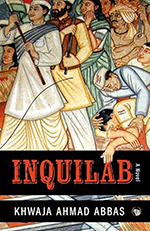The story told in Inquilab is the story of India as it is being told and taught through generations by now. It is the story of the birth of India as a nation, as people coming together to forge unity to not only counter but to overcome British colonialism. Inquilab chronicles a similar such saga of its hero Anwar and his life in the tumultuous period of early twentieth century colonial India. The story begins roughly from 1919 and goes up to the Gandhi-Irwin Pact held in the year 1931. The narrative runs like a movie—not very surprising as it is penned by a man who is also a renowned film maker in Bollywood—with its focus on the centrality of Hindu-Muslim unity against British imperialism. It is an engaging narrative which covers all the important aspects of the times when nationalism in India acquired its early shape and character through spirited resistance to the colonial government. So far so good, the novel keeps its readers engaged and offers a concise yet prevailing perspective of India’s struggle against British colonialism, and of the uninitiated. It draws attention to the significance of the undercurrents of the time period that it narrates. There is a studied attempt to bring all the different political hues—revolutionaries, loyalists (pro-government), moderates, and the communal extremists—of India’s struggle for Independence within the narrative. However, the perspective that the book offers is the very limitation of this work as well.
August 2025, volume 49, No 8

